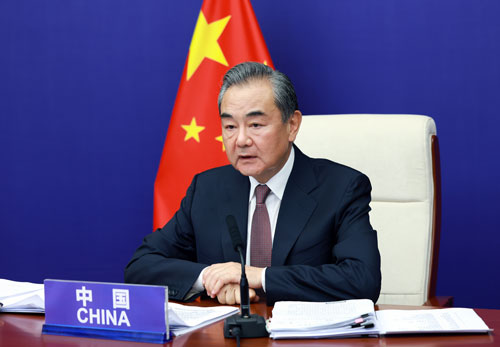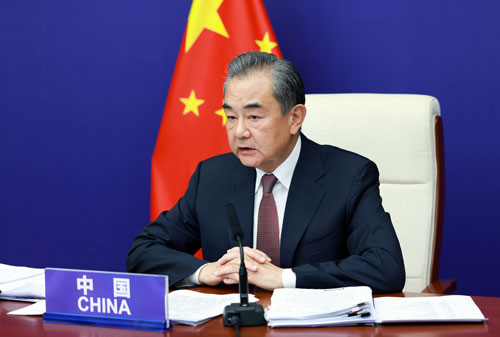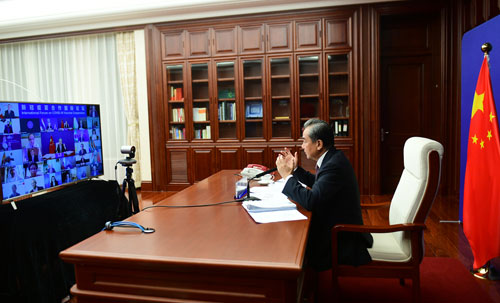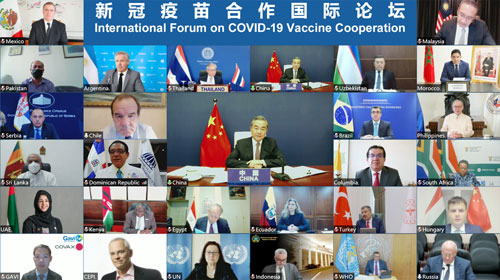| Wang Yi Hosts the First Meeting of the International Forum on COVID-19 Vaccine Cooperation |
| 2021-08-05 13:55 |
|
On the evening of August 5, 2021, the First Meeting of the International Forum on COVID-19 Vaccine Cooperation was held via video link. President Xi Jinping addressed the meeting, which was hosted by State Councilor and Foreign Minister Wang Yi, in a written form. First of all, Wang Yi read out the message of President Xi Jinping. Wang Yi said, President Xi Jinping expounded important propositions on furthering of international anti-pandemic cooperation in his written message, indicating that China will remain committed to the idea of building a global community of health for all and actively promote the international cooperation on vaccines. President Xi Jinping announced in his address that China will strive to provide two billion COVID-19 vaccine doses to the world throughout this year and offer 100 million U.S. dollars to the COVID-19 Vaccine Global Access (COVAX) facility, another major move for China to honor its commitment of making vaccines a global public good, and also allow it to make new contribution to the global cooperation against COVID-19. Noting that the novel coronavirus is still going viral around the world, Wang Yi said, vaccines matter so much to the humans' fight against the virus that they should be distributed worldwide fairly and reasonably, without a country or a person not granted access to them. Vaccines should be made vaccines of the people in the real sense. However, globally, there are still such outstanding problems as insufficient vaccine production capacity, inequitable distribution, and uneven vaccination. To triumph over this fight that bears on the future of the human race, we have no option but to stay united and work together.
First, we need to put lives above anything else and promote global access to vaccines. People's lives and health must be put in the first place, while other considerations such as economic and political interests are disallowed to prevail over. We must uphold the foremost attribute of vaccines as a global public good, and take actions to lest "vaccine nationalism" go on unchallenged. Vaccines are a weapon to save lives, instead of a means to seek a country's private interests or a tool for geopolitical games. Second, we need to defend morality and justice and offer more assistance to developing countries. The first is to address the "capacity deficit" by expanding supply and actively helping developing countries through technology transfer and cooperative production, as well as ensuring the global supply chains of raw materials. The second is to address the "distribution deficit" by strengthening and quickening vaccine sharing, and achieving universal access and affordability of vaccines in developing countries, especially the least developed countries (LDCs), as soon as possible. The third is to address the "cooperation deficit" by bringing the role of governments, enterprises and international organizations into full play and pooling their efforts in the spirit and with the responsibility of sticking together in times of difficulty. Third, we need to practice multilateralism and enhance the effectiveness of international cooperation. COVAX should become more efficient and transparent, ramp up and accelerate vaccine deliveries. Multilateral financial institutions such as the World Bank should provide fast, convenient and inclusive financing support for vaccine research and development, production and procurement. The World Trade Organization (WTO) should press ahead with discussions on the waiver of intellectual property rights on COVID-19 vaccines. All countries should respect certification systems such as the World Health Organization Emergency Use Listing, and conduct mutual certification and regulatory policy coordination in respect of vaccines in line with the scientific and fair principles. Fourth, we need to strengthen coordination and build multiple lines of defense against the pandemic. While strengthening the popularization of vaccine science, boosting public confidence, and accelerating the speed of vaccination, countries should also continue to coordinate drug and non-drug interventions, regular and precise prevention and control and emergency response, and pandemic prevention and control and economic and social development. Meanwhile, international joint prevention and control should be intensified to minimize the risk of cross-border spread of the pandemic.
Wang Yi said, last May, Chinese President Xi Jinping made a solemn commitment at the 73rd World Health Assembly that China would make vaccines a global public good, and make its contribution to vaccine accessibility and affordability in developing countries. We are true in word and resolute in deed. China has taken the lead in sharing the full-length genomic sequence of COVID-19 with the world, conducting phase III clinical trials of inactivated COVID-19 vaccines overseas, providing vaccines to developing countries in need, and cooperating with developing countries in vaccine production. China has donated and is donating vaccines to more than 100 countries, and has exported more than 770 million doses of vaccines to over 60 countries, the most of any nation in the world. Under our combined efforts, the United Arab Emirates (UAE), Egypt, Indonesia, and Brazil have become the first ones in their respective regions to have the production capacity of COVID-19 vaccines, which charted a new chapter of unity and self-reliance among developing countries. China has also actively provided vaccines to COVAX, UN peacekeepers and the International Olympic Committee. China has launched the Initiative for Belt and Road Partnership on COVID-19 Vaccines Cooperation days ago, and welcomes more countries to join the initiative. Wang Yi underlined, China has no political purpose in or does not seek any economic interests from its international cooperation in vaccines. And, there have never been any political conditions attached to such cooperation. Our only goal is to make vaccines a global public good and those for the people of the world in the real sense. We will continue to steadily increase our production capacity, provide more accessible and affordable Chinese vaccines to the world, and meet the needs of developing countries. In the year, we will strive to provide two billion doses of vaccines to the world. We will continue to deepen technology transfer and production capacity cooperation with developing countries, support the WTO in making an early decision on waiving intellectual property rights on COVID-19 vaccines, and support COVAX by delivering the first batch of more than 100 million doses of vaccines to the facility before the end of October and making good use of the 100 million U.S. dollar-donation just announced to the facility, so as to benefit more developing countries. The foreign delegates spoke highly of China's leading role in international anti-pandemic cooperation, especially vaccine cooperation, thanked China for honoring its commitment of making vaccines a global public good, providing the world, especially developing countries, with vaccines, and making outstanding contributions to promoting vaccine accessibility and affordability in developing countries, and appreciated China for hosting the First Meeting of the International Forum on COVID-19 Vaccine Cooperation at a time when the world is facing a new round of severe challenges from COVID-19. They said that vaccines are an important weapon for humans to triumph over the virus. However, vaccines are currently distributed quite unequally among countries in the world, resulting in a huge "immunization gap" between countries. As long as there are infections in a country, it is impossible for humans to completely defeat the virus. All parties should be united and strengthen cooperation, provide vaccines to developing countries, especially the LDCs, as best as they can, support the WHO's COVAX, do away with "vaccine nationalism", support the waiver of intellectual property rights on vaccines, further beef up international cooperation on vaccine production capacity, promote fair and equitable distribution of vaccines worldwide, and work together to win the pandemic battle at an early date.
The meeting was themed "strengthening international cooperation on vaccines, promoting fair and equitable distribution of vaccines around the world". Deputy prime ministers, foreign ministers, health ministers or high representatives of countries, including Thailand, Uzbekistan, Malaysia, South Africa, Argentina, Brazil, Turkey, Chile, Dominican Republic, Colombia, Egypt, Hungary, Indonesia, Kenya, Mexico, Morocco, Pakistan, the Philippines, Serbia, Sri Lanka, Ecuador, the UAE, and Russia, responsible officials of such international organizations as the United Nations, the WHO, the Global Alliance for Vaccines and Immunization and the Coalition for Epidemic Preparedness Innovations, and representatives from 29 Chinese and foreign vaccine manufacturers attended the meeting. The meeting adopted the Joint Statement of the International Forum on COVID-19 Vaccine Cooperation. |
|




